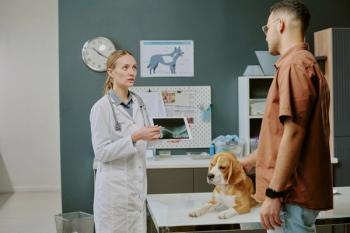
The Critter Fixers share 4 veterinary superpowers

Terrence Ferguson, DVM, and Vernard L Hodges, DVM, share how practitioners can uncover their own veterinary superpowers and incorporate them into the clinic
Sponsored by PetSmart
At the recent dvm360 Fetch Coastal conference in Atlantic City, New Jersey, Terrence Ferguson, DVM, and Vernard L Hodges, DVM—known together as the Critter Fixers—gave a keynote talk attributing 4 “superpowers” to veterinarians: stamina, steeliness, empathy, and the ability to utilize self-care.1 These traits can help veterinarians navigate their job to ensure both patient and practitioner are getting the most from each visit to the clinic.
1. Stamina
“It’s 5 minutes to 6 [o’clock] and you grab your keys and you put your jacket on…and the receptionist [or technician] meets you in the hallway,” said Ferguson. “They say, ‘Doctor, we have a dog coming in that was hit by a car.’ What do we do?” While a work-life balance is important, emergencies are unpredictable. Stamina is the superpower that helps veterinarians push through long hours on days when patients need their help. “We go to work, and we don’t think twice about doing it,” said Ferguson.
“We veterinarians can do it all day,” said Hodges. Resilience is a crucial skill for anyone working in the veterinary industry, but it is particularly crucial for those who respond to emergency cases that may not fit within the 9 to 5 o’clock window.
2. Steeliness
Steeliness, or being prepared to tackle the harder parts of the job, can be especially relevant when delivering bad news to clients. Whether the veterinarian informs the pet parent that their animal requires an expensive surgery or needs to be put down, that part of the job never gets easier. This composure not only helps veterinarians with communication; it helps them stay confident.
“Think about that surgery that you have to perform, and this animal is depending on you [performing] it,” said Ferguson. Often, veterinarians go into a procedure knowing that the chances of a negative outcome are high, or a pet requires a procedure immediately and the veterinarian hasn’t performed it in a long time.
“[That] definitely takes nerves of steel,” said Hodges. “We may not know the challenges that [we will face] in that room, but we do it over and over again.”
3. Empathy
“Empathy is our main superhero power,” said Hodges. Veterinarians are known to share a surplus of compassion. Making a connection with the patient and doing everything possible to ensure that patient is comfortable, happy, and healthy requires an innate understanding of the human-animal bond.
Ferguson joked that kids often assume veterinarians can talk to animals, but the idea isn’t void of truth. “We do talk to animals. We spend all our day communicating with animals and trying to make these animals better,” said Ferguson.
4. Self-care
“These superpowers are fantastic, but these superpowers can be taxing,” said Ferguson. Again, the hours can be long and there is no guarantee that every patient will get better, so it’s common for veterinarians to carry a heavy emotional burden.
“Suicide is way too prevalent in our profession,” said Hodges. “The CDC says that 1 out of every 6 veterinarians has considered suicide.”2 Ferguson and Hodges guaranteed the audience that self-care is an invaluable tool. It can help veterinarians lead a gratifying life both in and out of the practice.
“At the end of the day, we have to still understand that we’re human, and we have to take care of ourselves just like we have to take care of our patients,” said Ferguson. By maintaining a good support system and keeping up with fulfilling hobbies, veterinarians can continue using their superpowers to help patients while also protecting their own health.
References
- Ferguson T, Hodges V. Finding Your Veterinary Superpower. Presented at: Fetch dvm360 conference; October 9-11 2023; Atlantic City, New Jersey.
- Study: 1 in 6 veterinarians have considered suicide. March 18, 2015. American Veterinary Medical Association. Accessed October 12, 2023. https://www.avma.org/javma-news/2015-04-01/study-1-6-veterinarians-have-considered-suicide
Newsletter
From exam room tips to practice management insights, get trusted veterinary news delivered straight to your inbox—subscribe to dvm360.




